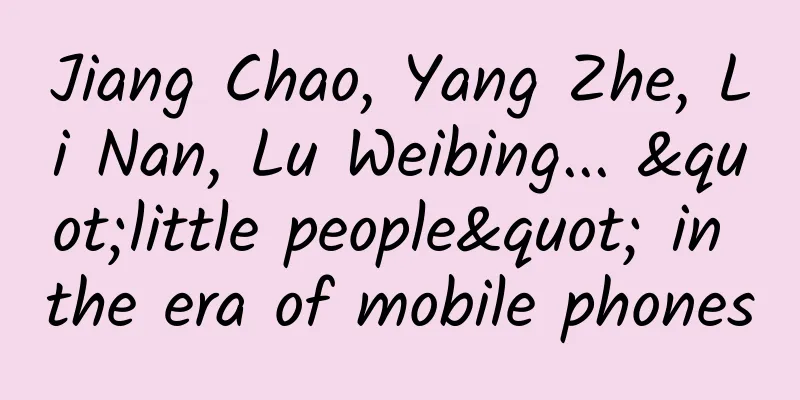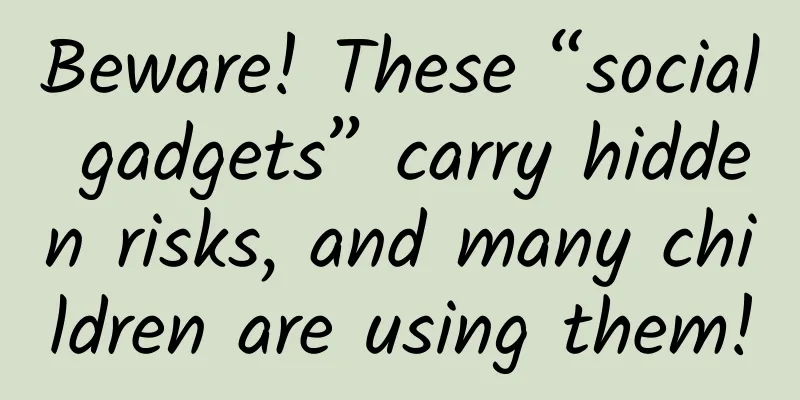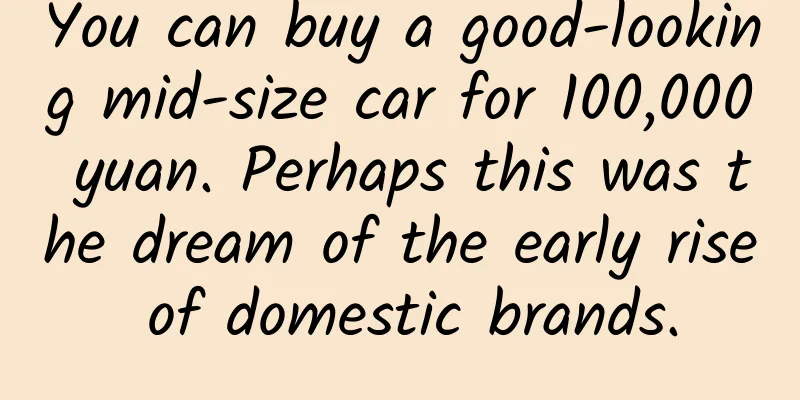Jiang Chao, Yang Zhe, Li Nan, Lu Weibing... "little people" in the era of mobile phones

|
Before Jiang Chao finished his words “Coolpad will take root in the United States in the future”, he was dismissed from his position as CEO. Jiang Chao, who wove the dream of "taking root in the American market" for Coolpad, should have never expected that when he spoke to the media at CES 2019 in the United States on January 11 about "attracting American funds to join and localizing Coolpad's American team", the Coolpad Group's board of directors also held a meeting in the afternoon of the 11th Beijing time and decided to remove Jiang Chao from all positions, including Coolpad and all its subsidiaries.
I have seen many CEOs (or other CXOs) of mobile phone companies "resign", but there is a world of difference between voluntarily resigning and being dismissed. Being dismissed by Coolpad Group means that the relationship between Jiang Chao and Coolpad has reached an extremely disharmonious point. And he could only say the next day that "I have no regrets about my youth and no regrets." At the beginning of 2019, Jiang Chao, who had joined Coolpad for 17 years, became the first CEO to be kicked out of the domestic mobile phone industry. This situation means that he has to silently bear the heavy "blame" for Coolpad's performance, which is already at the bottom. When we count the "CXOs" who have taken the blame in the mobile phone industry in the past one or two years, we find that there are quite a few of them, and their experiences reveal many similar patterns. Jiang Chao, a 17-year veteran, was given a mission but was powerless to save the situation. In Coolpad's long-delayed 2017 financial report, a "tragic" data was presented: the total revenue for 2017 was HK$3.378 billion, a 57.61% drop from 2016, and the loss for the year was HK$2.723 billion, a 38.13% reduction from 2016; as of the end of 2017, the debt-to-asset ratio was 80% (58% in 2016). Currently, Coolpad Group has been suspended for more than 21 months. Before the suspension, Coolpad's stock price was HK$0.72, with a market value of HK$3.62 billion. According to the new delisting system of the Hong Kong Stock Exchange, the Hong Kong Stock Exchange has the right to delist listed companies that have been suspended for more than 18 months. This also means that Coolpad is currently at great risk of being delisted. But is the miserable situation of Coolpad from 2017 to now due to Jiang Chao's incompetence? I'm afraid not entirely. According to the financial report, Coolpad Group's main revenue business still relies on the sales of mobile phones and accessories, accounting for 96.62% of its revenue. It is worth mentioning that in 2017, Coolpad's overseas business has exceeded its domestic business, which is the main reason why Jiang Chao has been encouraging the company to go abroad and develop overseas markets. Of course, the main reason for the overseas market to surpass the domestic market this time is that the domestic market has declined too fast.
Before becoming CEO, Jiang Chao was well known to outsiders because of his several verbal battles with 360 CEO Zhou Hongyi during the love triangle between 360, Coolpad and LeTV. With the end of the "love triangle", Jiang Chao was no longer in the spotlight until he was appointed in early 2018 to succeed Liu Jiangfeng as Coolpad CEO. In August 2017, Liu Jiangfeng, the former president of Huawei Honor appointed by Jia Yueting, left in disgrace, and Jiang Chao took over as CEO. At that time, Coolpad was already on the edge of the market. Jiang Chao, who had been in charge of Coolpad's financial and administrative affairs for a long time, took emergency measures to stop the bleeding of the company, including improving the company's finances and rectifying loss-making businesses. According to Coolpad's 2017 final performance announcement, Coolpad has taken a number of measures to ease liquidity pressure and improve the group's financial situation, including but not limited to actively negotiating with banks to ensure that the group's bank loans are renewed when they expire and repay matured liabilities. In addition, Coolpad also carried out self-rescue by laying off employees and selling land. The financial report shows that Coolpad Group had 4,504 employees in 2016, but only 1,421 employees by the end of 2017, a reduction of more than two-thirds; in terms of real estate business, on July 25, 2018, Coolpad signed an agreement to sell its investment property in Shenzhen for HK$118 million; on July 30, Coolpad signed an agreement to sell 80% of the equity of a wholly-owned subsidiary for a cash consideration of HK$120 million, and there was a plot of land under the agreement. Of course, these measures only serve to "extend the life" of Coolpad Group and did not solve Coolpad's core problems in 2018. The weakness of the mobile phone business is the main reason that dragged Coolpad to the bottom. Currently, Coolpad's three main business sectors are sales of mobile phones and accessories, wireless application services, and financing services. Among them, the sales of mobile phones and accessories are the absolute main force, accounting for 96.62% of revenue. However, Coolpad's performance in the mobile phone market has continued to be sluggish. Throughout 2018, Coolpad only launched new phones for the low-end market. The main model Cool Play 8 currently launched in the online market has only 7,200+ user reviews on JD.com since its release in December last year. This more than a month includes the New Year sales peak, and the result of less than 10,000 reviews is dismal. Perhaps the most valuable business of Coolpad is its early land resources. Coolpad's current major shareholder, Wei Ri Venture Capital, may value these land resources. According to a report from China Business News, "Wei Ri Venture Capital is likely to be backed by the capital of Beijing Capital Real Estate." The answer to why this major shareholder with a real estate background was willing to take over the Coolpad shares sold by Jia Yueting is obvious. Therefore, as a technology company, it is ironic that Coolpad's major shareholders may not care about the market performance of communication technology and mobile phone products. Now, Jiang Chao has been kicked out as the "scapegoat", but Coolpad still has not solved the substantive problems it is facing. Can Chen Jiajun, the new executive director and CEO who took office on January 17, turn the tide? What new prospects will this 27-year-old former president of Kingkey Baina Commercial Management Co., Ltd. bring to Coolpad? Looking back at veteran Jiang Chao, perhaps his fate was already determined when he took over as CEO. Coolpad management obviously did not have much patience to wait for him to complete the so-called overseas growth. Looking at the entire mobile phone industry, it is not just Coolpad that lacks patience. Many CXO-level "scapegoats" have their own difficulties and perhaps too much helplessness. Yang Zhe, who is good at playing the cultural card: was "rejected" after 14 months
Yang Zhe, the current CSO of Meizu, had a similar experience at TCL. In just 14 months, he went from taking office to leaving in disgrace. Yang Zhe is definitely a well-known figure in the field of domestic smartphones, and his career resume is quite impressive. He started at Motorola and worked at Apple from 1996 to 1999 (leading the launch of iMac in China). He later joined Samsung and served as Samsung China CMO. During his 9 years at Samsung, Yang Zhe led Samsung to double its sales, from seventh to first in the Chinese market. In 2012, Yang Zhe joined Huawei, and in three years, Yang Zhe successfully upgraded Huawei's brand and entered the high-end market. However, such a veteran with more than ten years of market experience met with a setback at TCL. In October 2015, Yang Zhe became the president of TCL Communication China. At that time, although TCL Communication had a certain shipment volume worldwide, most of it was Alcatel's low-end and feature phones in overseas markets. In the domestic market, TCL Communication was not recognized by the market. The primary purpose of TCL Group's introduction of Yang Zhe was to improve TCL Communication's weak performance in the domestic market. After Yang Zhe, who is good at playing the cultural card, joined TCL, he also took rapid steps to reform. Yang Zhe launched the famous slogan "Tout Comme La Vie" for TCL Communication, trying to change the inherent image of TCL Communication among domestic users.
At that time, TCL's main model 750 was not ambiguous in terms of marketing and advertising. Large posters of the model could be seen everywhere in crowded places such as airports and train stations. This was also an important move by Yang Zhe to enhance the brand tone of TCL. However, Rome was not built in a day. To get rid of the old-fashioned impression of users and establish a new brand image, it takes not only time, but also the support and cooperation of TCL's overall resources. Yang Zhe wanted to fight a protracted war at TCL, but Chairman Li Dongsheng was obviously unwilling to wait. Just one year later, before TCL's brand upgrade was completed, Yang Zhe was kicked out. In February 2017, Yang Zhe officially left TCL, less than 14 months after he officially took office in December 2015. According to the 2016 financial report released by TCL Group, TCL Communication Technology achieved sales revenue of 20.39 billion yuan in 2016, a year-on-year decrease of 15.8%; and achieved EBITDA of -474 million yuan. Obviously, poor market performance is also the main reason why Yang Zhe was kicked out. For TCL Communication, which is in transition, the short-term decline in mobile phone performance is not incomprehensible. But Li Dongsheng, who is eager for success, hopes to achieve results in a short period of time. Yang Zhe is obviously not the "god" that is expected. According to data released by TCL, TCL Communication shipped 68.766 million units worldwide in 2016, down 17.7% from 83.55 million units in 2015. At the same time, TCL's feature phone shipments in 2016 were 29.786 million units, accounting for 43%. Such a high proportion also means that TCL's transformation will take some time. It is said that it is difficult to turn a big ship around. Perhaps Yang Zhe can only sigh in vain when facing a giant ship like TCL.
After Yang Zhe left, Li Dongsheng took charge of TCL Communications and brought BlackBerry, Palm and other old brands back to the forefront. However, this attempt to rehash old ideas and play on the sentimental card did not gain market recognition. According to TCL Group's financial report, the shipment volume of mobile communication products in 2017 was 43.876 million units, a year-on-year decrease of 36.2%. If it is said that Jiang Chao and Yang Zhe were both unable to reverse the company's fate in the short term due to lack of time, then Meizu's Li Nan is even more unfairly blamed, as he is not trusted even after making achievements. Li Nan, who supports Meilan, cannot support Huang Zhang's confidence
In fact, given Li Nan’s current status, it may not be appropriate to put him here. After all, he is still the CMO of Meizu, and the Meizu Blue brand, of which he served as president, has become history. In the years when Huang Zhang "retired", Meizu could not get flagship chips in the high-end field due to the dispute between Meizu and Qualcomm, so it could not make greater breakthroughs. During this period, Meizu Blue, which mainly focused on mid-to-low-end and cost-effective models, actually took on the sales responsibility of Meizu. As the former head of the Meizu Blue brand, Li Nan did not hesitate to use the strategy of launching a large number of machines in order to ensure sales. Although the frequent product updates have attracted some criticism, the Meizu Blue brand's thousand-yuan machines have indeed largely supported Meizu's sales and revenue in recent years. But after Huang Zhang returned to the company in 2017, he resolutely killed the Meizu Blue brand in order to strengthen his pursuit of profits. Li Nan also changed from the original Meizu Blue president to the current Meizu CMO. Huang Zhang's comeback, while dismissing Bai Yongxiang, also killed the Meizu Blue brand that supported Meizu's sales. This may be Li Nan's resentment. From an operational perspective, cutting off Meizu Blue is equivalent to cutting off Meizu's revenue guarantee. According to data released by third-party research organization Sino, from January to November 2018, Meizu's overall shipments were 9.07 million units, of which only 470,000 units were shipped in November, a year-on-year decline of 65% and a month-on-month decline of 8%. Judging from this performance, Meizu's sales in 2018 will probably not exceed 10 million units. Compared with the sales of nearly 20 million units in 2017, it is almost halved. Currently, Huang Zhang is in full control of Meizu, and Li Nan, who lost his title as president of Meizu Blue, is no longer in charge of the mobile phone product line, but has been assigned to be in charge of marketing and e-commerce related businesses. Perhaps we will still see him speaking at Meizu's press conferences in the future, but he will no longer be the helmsman of the mobile phone business line. As for the fate of Meizu, it is hard to say for sure. Not long ago, there was news that the Zhuhai government would inject funds to support the development of Meizu. Meizu officials also announced that the Zhuhai Meizu Technology Co., Ltd. CPC Committee was officially established, and shouted out the slogan "Industry will prosper the country, and domestic products should be self-reliant!" If Meizu can obtain financial support at the government level, it may be able to get some breathing room and fight again when 5G comes. Unable to save the situation, Lu Weibing: We need to use Redmi's performance to speak out
Gionee's bankruptcy and liquidation is definitely a major event in the smartphone industry in 2018. The fact that Lu Weibing, the former president of Gionee, joined Xiaomi two weeks ago to take charge of the newly independent Redmi brand is also seen as another major event in the smartphone field in 2019. To this day, although we cannot attribute the entire cause of Gionee's bankruptcy to Liu Lirong's gambling, no one can deny that Liu Lirong's gambling accelerated Gionee's downfall. In the process of Gionee's downfall, Lu Weibing, as the president of Gionee, was definitely the "scapegoat". In the early days of joining Gionee, Lu Weibing's actions were more like planning and observing market changes. In 2009, he joined Gionee as the president of Gionee. It was not until 2012 that Gionee officially launched smartphones. Compared with other brands, Gionee's response was a bit slow. As Internet mobile phone brands such as Xiaomi brought impact to the market, Lu Weibing immediately led Gionee to launch two sub-brands, ELIFE and IUNI. However, these two brands, like most Internet sub-brands of traditional mobile phone companies, ultimately failed to succeed. With the cancellation of these two brands, Liu Lirong returned to the front stage, and Lu Weibing's position within the company became very awkward, and there were even rumors that he was sidelined. Although these attempts at younger brands were not successful, they also accumulated valuable experience for Gionee in changing its brand image and establishing cost-effective Internet mobile phones. At the same time, Gionee's achievements in overseas markets, especially in India, are remarkable. In 2014, Gionee shipped more than 4 million units in the Indian market, which is the total sales of all Chinese mobile phone manufacturers in the Indian market. Regarding his experience in the Indian market, Lu Weibing once described it this way: "I am very familiar with all the local brands in India. They will come to me when they start making mobile phones, including Micromax, Karbonn and Lava, as well as some dead manufacturers."
In August 2017, Lu Weibing led the separation of Gionee's overseas business unit from Gionee and established a new company called Chengyi Technology, which was mainly responsible for OEM for a number of mobile phone brands including Transsion. At that time, most public opinion interpreted this separation as Lu Weibing's "exit". With the explosion of Gionee's capital chain, Lu Weibing's Chengyi Technology was also affected. Finally, in November 2018, Lu Weibing announced the dissolution of Chengyi Technology, and then he was recruited by Lei Jun. It is undoubtedly biased to say that Lu Weibing has not made great contributions to Gionee, otherwise Lei Jun would not have rushed to recruit him and entrusted him with the important task of developing the Redmi empire. If he wants to prove himself, Lu Weibing must speak with Redmi's performance as soon as possible. Lenovo Mobile's frequent changes: a group of CXOs with ill-fated fates
Among the many mobile phone companies in China, Lenovo Mobile is definitely the one with the most frequent changes, whether it is changes in product lines, brands or CXOs. Three years ago, as a candidate to succeed Liu Jun, the then president of the Mobile Business Group, Chen Xudong, the former CEO of Magic Factory, became the new president of the Mobile Business Group. As a brand incubated by Magic Factory, Chen Xudong gave the ZUK brand a lot of room for development after taking office in June 2015. With its super cost-effective products, ZUK did gain certain user recognition in the early stages of its development. However, Chen Xudong failed to change the direction of the mobile business left by Liu Jun. He gradually retreated behind the scenes in 2016 and officially left Lenovo in May 2017. Qiao Jian, who took over Lenovo's mobile business at the end of 2016, successively recruited several senior executives from Samsung, China Mobile and other companies, but these airborne executives did not bring Lenovo Mobile back to life. Among them, the MOTO Z 2018, which was once entrusted with an important task by Lenovo, is one of the "negative" teaching materials. In order to impact the high-end market and obtain better profits, Lenovo directly set a price of nearly 10,000 yuan for the MOTO Z 2018. However, Lenovo obviously overestimated the premium ability of the MOTO brand. Giving up the mass market for profit and betting on the niche high-end group is obviously not a wise choice. From 2017 to the end of 2018, many executives who were once highly expected left the company, and product lines such as ZUK, Lemon, and VIBE were also cut one after another. Among them, Yu Gao, head of Lenovo Mobile's channel sales in China, and Ma Daojie, head of strategic transformation and business breakthroughs, left the company in 2017; Jiang Zhen, head of Lenovo MBG China business, and Zhu Han, Lenovo vice president, left the company in April 2018; in May 2017, Liu Jun, who had left Lenovo for more than two years, announced his return to Lenovo to lead the Chinese platform and China PCSD Group business; in early January 2018, Chang Cheng, the former CEO of ZUK mobile phones, officially returned to Lenovo Mobile, and returned with a product team of about 100 people.
In 2018, Chang Cheng, who returned to Lenovo, stood at the forefront of Lenovo Mobile again. Liu Jun also supported Chang Cheng at the mobile phone launch conference after his return. So what are the achievements of Lenovo Mobile in the past year? At present, Lenovo Mobile has released a number of new phones in succession, and has repeatedly used slogans such as "first release" and "world's first" at the press conference. However, Chang Cheng is now nicknamed "Magneto" by many netizens because he frequently touches other brands in publicity. For Chen Xudong and a group of mobile phone brand executives, their backs have become history. In the future, what results will the release of a series of new phones and the marketing of "Magneto" achieve? Let the financial reports and performance prove everything. 【Conclusion】 In the iteration of the entire communications industry, the industry has experienced countless reshuffles. From 2G to 3G, 4G, and then to the coming 5G wave, almost every decade of technological iteration is a major reshuffle of the industry. In the process of these reshuffles, some brands have successfully risen, and some brands have been submerged in the torrent of the times. As executives of mobile phone companies, perhaps they did make wrong decisions in some places, but sometimes the entire group chose the wrong strategic direction, but as the helmsman of the company, they can only take this "pot", or they need to take the blame for this era. Looking back at 2018 and looking forward to 2019, a new round of industry reshuffle has arrived. Niche brands are gearing up to challenge the hegemony, while the giants are also on high alert, fearing that they will make a wrong move. Who will stand out in this wave and who will become the next "scapegoat"? Time will tell. |
<<: Apple pushes iOS 12.1.3 to fix accumulated system bugs
Recommend
QQ is testing a "friend expansion" feature similar to the message in a bottle, is it again getting involved in stranger social networking?
[[259529]] Recently, QQ launched a stranger socia...
Why do others feel full of energy while I still feel so sleepy even though we both sleep for 8 hours?
"How long is the best sleep for a person?&qu...
The ultimate in automotive energy: How long will it take for hydrogen-powered vehicles to become popular?
Today, the "dual carbon" goals of carbo...
6 practical cases of marketing and promotion of Bilibili!
Today, the fragmented society has led to a sharp ...
Fun fact: Why don’t herbivores eat meat?
I recently saw an interesting question. A netizen...
Bilibili (Bilibili) Product Analysis
Bilibili was originally a two-dimensional website...
Android application marketing strategy and plan
I often visit some small restaurants with good se...
What happens to your body if you eat 1 bowl of rice noodles every day? Eating this way is healthier →
Rice noodles are a very popular delicacy in south...
HTC M8 Full Disassembly
After removing the SIM card and micro SD card slot...
How to acquire accurate users and achieve maximum conversion through SEO, SEM and WeChat public account operation
How to use SEO technology to double the website&#...
Why do all the unearthed Terracotta Warriors have single eyelids? It may be due to these two reasons →
A reporter recently learned from the Qin Shihuang...
If the whole of China was a class, Guizhou would be the classmate who secretly played PlayerUnknown's Battlegrounds!
Mixed Knowledge Specially designed to cure confus...
Documentary about Chinese mayors, BBC documentary "Chinese Mayors"
Geng Yanbo, the former mayor of Datong City, Shan...
A long article to understand all the tricks of the "100,000+" title
This is an era of "information miniaturizati...
How does China combat desertification? | World Day to Combat Desertification and Drought
Produced by: Science Popularization China Author:...









